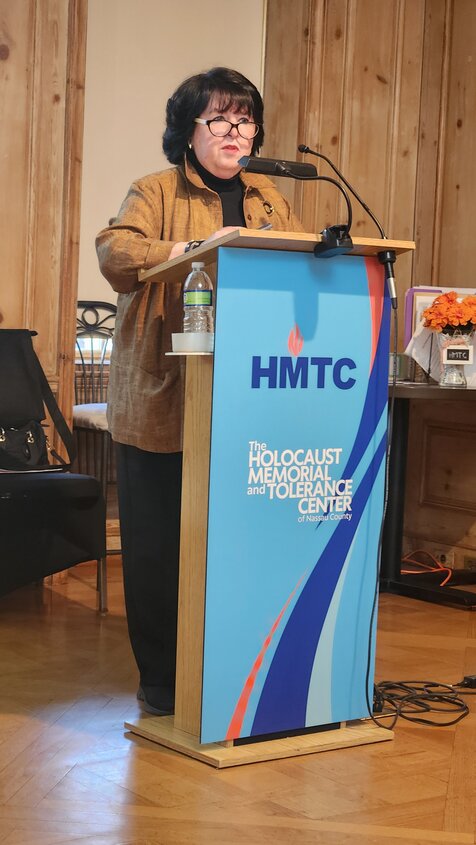When a memoir helps to preserve history
To commemorate the anniversary of the Armenian Genocide, the Holocaust Tolerance and Memorial Center of Nassau County hosted a book presentation by Adrienne Alexanian to discuss her father’s memoir, “Forced into Genocide.”
Alexanian’s exploration into her father’s past revealed a treasure trove of hidden history. After Yervant Alexanian’s passing in 1983, Adrienne delved into his belongings and unearthed a handwritten manuscript detailing his harrowing experiences during the Armenian Genocide, where he tragically lost 51 immediate family members.
The Armenian Genocide was a systematic campaign of extermination carried out by the Ottoman Empire against its Armenian population during World War I. Beginning in 1915, Armenians were subjected to mass deportation, forced marches, and massacres, resulting in the deaths of an estimated 1.5 million Armenians. The genocide was marked by widespread atrocities, including torture, starvation and mass killings. Despite ongoing denial by the Turkish government, the Armenian Genocide is widely recognized as one of the first modern genocides.
But for Glen Cove residents like Lynn Jamie, also a descendent of Armenian genocide survivors, her family history comes in fractured anecdotes from relatives. Her mother, Alice Boghosian, seldom spoke of the horrors she endured as a captive, often breaking down in tears when she attempted to share her experiences. Boghosian, was one of nine siblings, of whom only she and two sisters, along with their mother, managed to escape the march across the Syrian desert.
In 1916, the then 9-year-old Boghosian and her family eventually arrived in America through Ellis Island, where they faced challenges trying to enter the United States due to an illness Boghosian contracted, which caused her to lose one of her eyes in the orphanage. Authorities wanted to ensure that her illness wasn’t contagious. Despite these hardships, she pursued higher education, becoming a dental hygienist and working diligently to provide for her family.
Jamie added her strength in life comes from her mother, because despite the hardships she endured, her mother still pursued higher education to become a dental hygienist and worked hard to raise a family.
“To have that some of that writing that’s incredible,” Jamie said after the event. “I have nothing in writing, and Adrian is very fortunate to know all of her history.”
Years of dedication culminated in the publication of the book. This edition, painstakingly translated from Yervant’s original Armenian chronicle, shows previously unseen documents and photos meticulously preserved by the author.
“My father always wanted his story to be told to promote Armenian Genocide recognition, but since he was a prolific writer on the subject for the Armenian newspapers, I thought he had already achieved his because he never told my mother or me that he had written his own memoir,” Alexanian said. “Interestingly, I also found a letter from MGM Studios in response to a letter my father had written, rejecting his offer to write a screenplay about his experiences as a survivor of the Armenian Genocide.”
What sets Alexanian’s account apart is his ability to not only document the brutality of the genocide but also to offer a unique behind-the-scenes glimpse into the motivations and actions of the Turkish military officials responsible for the atrocities. His narrative provides a nuanced understanding of the dynamics at play during this dark chapter, shedding light on both the cruelty of the perpetrators and the unexpected moments of humanity that occasionally emerged amidst the chaos.
“An aspect of the genocide that really hasn’t been brought to light that of Armenian soldiers conscripted into the Ottoman Turkish army during the Armenian Genocide,” Alexanian’s said. “The popular belief was that everybody was killed, all the conscripted soldiers were killed. But my father’s memoir dispels that belief.”
There are no other books in Armenian literature on this aspect of the genocide, making her father’s memoir essential for historians. Through “Forced into Genocide,” Alexanian not only honors her father’s memory, but also ensures that the voices of the past resonate with future generations, inspiring remembrance, recognition, and resilience in the face of adversity.






